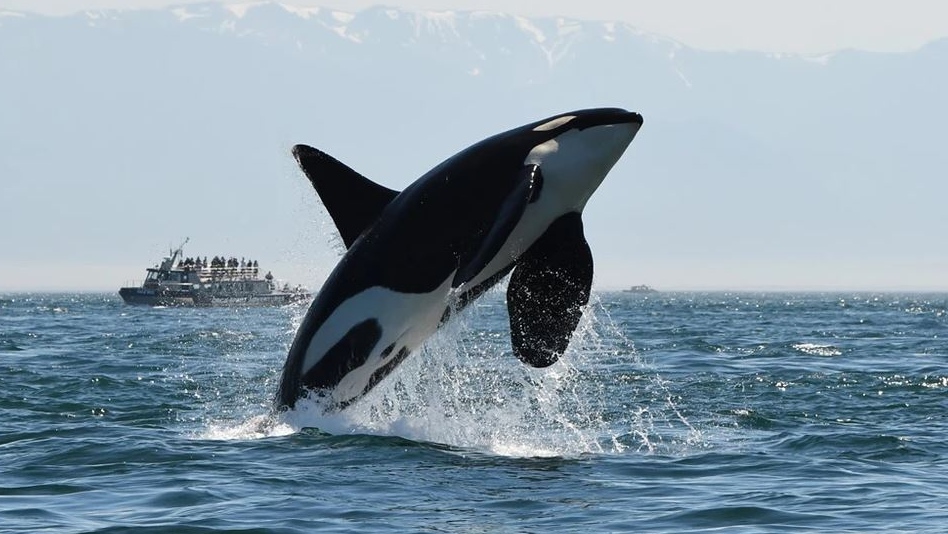Endangered orcas suffered calorie deficit in recent years: UBC study
 Southern resident orca K25 is seen in mid-breach. Researchers now fear the killer whale is one of three endangered southern residents that have died. (Dave Ellifrit/Center for Whale Research)
Southern resident orca K25 is seen in mid-breach. Researchers now fear the killer whale is one of three endangered southern residents that have died. (Dave Ellifrit/Center for Whale Research)
A new study released by the University of British Columbia found that southern resident killer whales (SRKW) did not have enough to eat in recent years, which correlates to higher mortality and lower fertility rates.
The study tracked the critically endangered SRKWs over the past 40 years, and found that they did not get enough to eat in six of those 40 years – three of which occurred in the most recent years of the study, from 2018 to 2020.
On average, adult killer whales were about 28,716 calories short in their diet in the six years that deficits were recorded, or about 17 per cent of their average daily energy requirements, according to the study.
"With the southern resident population at such a low level, there’s a sense of urgency to this kind of research," said lead author Fanny Couture, a doctoral student at the Institute for the Oceans and Fisheries (IOF) and Ocean Wise, in a release Monday.
As of October 2021, the SRKW population numbered about 73 orcas.
CHINOOK SALMON DECLINES
The southern residents feed mostly on Chinook salmon, and when Chinook salmon populations declined, the orcas were affected, the study found.
"The years where southern residents were in an energy deficit are also years where other studies report lower population growth rate and higher mortality rates for the killer whales," said Dr. Villy Christensen, professor at IOF and co-author of the study.
Researchers are uncertain why Chinook salmon populations are declining, though there are several factors, including climate change, disease, and predation by other animals.
Commercial fishing also plays a role, though researchers say Chinook salmon harvesting was reduced in Canada in the late 1990s, and that salmon declines have continued over the past two decades.
"Those declines have continued despite severe fisheries reductions, and one very likely candidate for causing them is the massive increase in abundance of Steller sea lions since the mid-1980s; those sea lions now consume more fish than all the B.C. commercial fisheries for all species, combined," said Dr. Carl Walters, senior author of the study and retired professor at IOF.
MORE FISHING RESTRICTIONS MAY BE NEEDED
Researchers found that when Chinook salmon populations were particularly low, southern resident killer whales would feed on other types of salmon, such as chum. However, their energy deficits would still occur.
Study co-authors say more restrictions on Chinook salmon fishing may still be required to protect both the fish and the orcas, as well as further research into underwater noise pollution.
"Both killer whales and Chinook salmon, the southern resident’s main prey, are important, iconic species for the west coast of Canada," said Couture
"Studying what is happening to the population may help offer solutions, both for the southern residents and potentially other killer whale populations in the future."
CTVNews.ca Top Stories

Pedestrian, baby injured after stroller struck and dragged by vehicle in Squamish, B.C.
Police say a baby and a pedestrian suffered non-life-threatening injuries after a vehicle struck a baby stroller and dragged it for two blocks before stopping in Squamish, B.C.
Senate expenses climbed to $7.2 million in 2023, up nearly 30%
Senators in Canada claimed $7.2 million in expenses in 2023, a nearly 30 per cent increase over the previous year.
Demonstrators kicked out of Ontario legislature for disruption after failed keffiyeh vote
A group of demonstrators were kicked out of the legislature after a second NDP motion calling for unanimous consent to reverse a ban on the keffiyeh failed to pass.
Tom Mulcair: Park littered with trash after 'pilot project' is perfect symbol of Trudeau governance
Former NDP leader Tom Mulcair says that what's happening now in a trash-littered federal park in Quebec is a perfect metaphor for how the Trudeau government runs things.
RCMP uncovers alleged plot by 2 Montreal men to illegally sell drones, equipment to Libya
The RCMP says it has uncovered a plot by two men in Montreal to sell Chinese drones and military equipment to Libya illegally.
Government agrees to US$138.7M settlement over FBI's botching of Larry Nassar assault allegations
The U.S. Justice Department announced a US$138.7 million settlement Tuesday with more than 100 people who accused the FBI of grossly mishandling allegations of sexual assault against Larry Nassar in 2015 and 2016, a critical time gap that allowed the sports doctor to continue to prey on victims before his arrest.
Man wanted in connection with deadly shooting in Toronto tops list of most wanted fugitives in Canada
A 35-year-old man wanted in connection with the murder of Toronto resident 29-year-old Sharmar Powell-Flowers nine months ago has topped the list of the BOLO program’s 25 most wanted fugitives across Canada, police announced Tuesday.
Doctors ask Liberal government to reconsider capital gains tax change
The Canadian Medical Association is asking the federal government to reconsider its proposed changes to capital gains taxation, arguing it will affect doctors' retirement savings.
Pro-Palestinian protests roiling U.S. colleges escalate with arrests, new encampments and closures
The student protests of Israel's war with Hamas that have been creating friction at U.S. universities escalated Tuesday as new encampments sprouted and some colleges encouraged students to stay home and learn online, after dozens of arrests across the country.






























